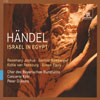Handel Israel in Egypt
Stand-out soloists make this recording of Handel’s epic oratorio worth hearing
View record and artist detailsRecord and Artist Details
Composer or Director: George Frideric Handel
Genre:
Vocal
Label: BR Klassik
Magazine Review Date: 8/2010
Media Format: CD or Download
Media Runtime: 106
Mastering:
Stereo
DDD
Catalogue Number: 900501

Tracks:
| Composition | Artist Credit |
|---|---|
| Israel in Egypt |
George Frideric Handel, Composer
Azuko Suzuki, Soprano Bavarian Radio Chorus Concerto Köln George Frideric Handel, Composer Gerhild Romberger, Alto Kobie van Rensburg, Tenor Peter Dijkstra, Conductor Rosemary Joshua, Soprano Simon Pauly, Baritone Thomas Hamberger, Bass-baritone |
Author: David Vickers
The performance is pretty good, much like several other Germanic recordings of the 1739 version. Few collectors buy a recording of Israel in Egypt based on the quality of the sporadic solo numbers but Peter Dijkstra’s six soloists are consistently good (especially Kobie van Rensburg’s theatrical “The enemy said”). Concerto Köln play with muscularity but Dijkstra adopts a generally slowish and clumpy style in Part 1, which robs Handel’s writing of its sensitively painted mixed emotions; the Bavarian Radio Chorus does not seem to be very large, although it makes a grand old-fashioned choral society noise (eg the quiet passages of “Their bodies are buried in peace”). Its English pronunciation is flawless. Several movements in Part 1 adhere to the inauthentic post-Handel tradition of allocating the choral parts to a quartet of soloists (only Harry Christophers and The Sixteen get this correct on disc), but the tragic tone of the anthem’s final string coda is perfectly judged. Part 2 contains the most convincing highlights: Dijkstra produces the cumulative tension at the peak of “They loathed to drink of the river” effectively (alas, the choir doesn’t exploit the dramatic thrust of the words until the movement climaxes); the archaic personality of “He spake the word” is realised boldly, and the blood and thunder (and unleashed trombones) of “He gave them hailstones” are illustrated with fieriness. Part 3 is performed confidently but I would have liked to hear greater mystery and controlled tenacity in “The people shall hear”, and the perfunctory string playing in “Thou shall bring them in” could afford to be lovelier. Dijkstra achieves another worthy entry into a competitive discography but the 1989 recording by Andrew Parrott (Virgin, 2/91) is still the benchmark.
Discover the world's largest classical music catalogue with Presto Music.

Gramophone Digital Club
- Digital Edition
- Digital Archive
- Reviews Database
- Full website access
From £8.75 / month
Subscribe
Gramophone Full Club
- Print Edition
- Digital Edition
- Digital Archive
- Reviews Database
- Full website access
From £11.00 / month
Subscribe
If you are a library, university or other organisation that would be interested in an institutional subscription to Gramophone please click here for further information.




